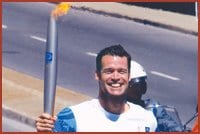Outgames officials are downplaying hassles with Immigration Canada.
Despite Jul 12 news reports that 250 visas for athletes and others have not been processed and that 16 applications had been rejected, organizers repeatedly put off publicly commenting on the matter.
As Capital Xtra’s press deadline approached Jul 17, Outgames spokesperson Pascal Dessureault said Immigration Canada is being “really helpful. We feel that the file is being unblocked at the moment. It’s getting better hour by hour.”
Some reports suggest the majority of held-up visas are for people attending a human-rights conference being held in parallel with the Outgames. One media report suggested those who have had visas denied them may have criminal records for being gay in nations where it is still illegal.
Outgames representatives met with cabinet ministers over the issue following media reports of the hold-up, notes Raymonde Folco, the Opposition Liberal critic. Folco says the Conservative government’s anti-gay views may explain why entry approvals are so slow.
“I am sure you would agree that Canada appears to be sending a double message by not allowing these participants to enter Canada,” she wrote to Citizenship and Immigration minister Monte Solberg Jul 11. “We as a country believe in the equality and human rights of individuals, regardless of sexual orientation. At the same time, we are sending the message that being gay, lesbian, bisexual or transgendered is similar to moral turpitude and therefore exclusion is warranted. As you are aware, Canada’s Immigration Act historically forbade and even deported people who lived together and were unmarried.”
Former Liberal Immigration Minister Denis Coderre made the visa jam public in a Jul 11 media release.
“It is absolutely nonsensical that the organizers of the Outgames, who are sponsoring the travel and lodging expenses for these participants, can’t even get an explanation as to why this process has been so slow,” he said.
But Solberg’s office is adamant that there is no discrimination based on sexual orientation. “What’s happening is that the game organizers have given the Citizenship and Immigration department a list of 250 participants who’ve been invited to attend,” says Lesley Harmer, director of communications for Solberg. “We’ve confirmed through our visa offices that fewer than half of the participants on the list have really submitted a visa application.”
Some Outgames participants are reported to have applied for a visa a year ago.
Media have reported that 16 or 18 conference participants have been turned down for a visa to Canada. Being gay is still a crime in many nations.
Marina Wilson, a spokesperson for the department of Citizenship and Immigration says a criminal record for homosexuality could cause a delay in processing a visa application.
If the visa applicant’s criminal record “is not straightforward, that could add to the time. We look at passports on a case by case. Sometimes there are some follow-up phone calls, confirmations, faxes, and you know how it is — it takes a while for somebody to call you back.”
Canadian policy is to not deny a visa for somebody convicted of an offence that is legal in this country.
Folco notes in her letter that the federal government has donated at least $350,000 to the Outgames, along with $200,000 from the Canadian International Development Agency. Over the past three years, the Department of Canadian Heritage granted some $150,000 in operational expenses. And the games received another $1.4 million in economic development funding.

 Why you can trust Xtra
Why you can trust Xtra


